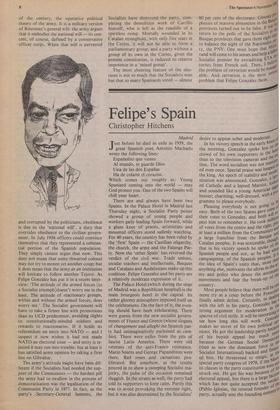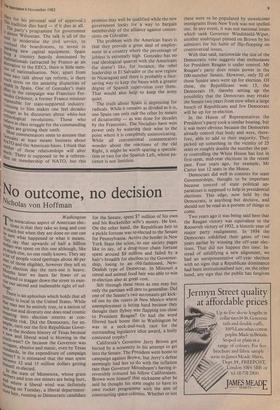Felipe's Spain
Christopher Hitchens
Madrid
Just before he died in exile in 1939, the great Spanish poet Antonio Machado wrote the following lines:
Espaitolito que vienes Al mundo, to guarde Dios Una de las dos Espailas Ha de colarte el corazon.
Which comes out roughly as: Young Spaniard coming into the world — may God protect you. One of the two Spains will chill your heart.
There are and always have been two Spains. In the Palace Hotel in Madrid last Thursday night, a Socialist Party poster showed a group of young people and workers gaily leading Spain forward, while a glum knot of priests, aristocrats and mounted officers stood sullenly watching. For 40 years, the country has been ruled by the 'first' Spain — the Castilian oligarchy, the church, the army and the Falange Par- ty. Now the 'other Spain' has reversed the verdict of the civil war. Trade unions, secular teachers and intellectuals, Basques and Catalans and Andalusians make up this coalition. Felipe Gonzalez and his party are a relatively moderate expression of it.
The Palace Hotel (which during the siege of Madrid was a Republican hospital) is the main bourgeois hotel in the capital. Its rather gloomy atmosphere imposed itself on the celebrations. On the face of it, the even- ing should have been exhilarating. There were guests from the new socialist govern- ments of France and Greece (whose slogans of changement and allaghi the Spanish par- ty had unimaginatively purloined as cam- bio). There were exiles from the pits of fascist Latin America. There were old veterans of the anti-Franco resistance. Mario Soares and George Papandreou were there. Red roses and carnations pro- liferated. But somehow, as the results poured in to show a sweeping Socialist ma- jority, the pulse of the occasion remained sluggish. In the streets as well, the party had told its supporters to keep calm. Partly this was to avoid provoking the extreme right, but it was also determined by the Socialists' In his victory speech in the early hour the the morning, Gonzalez spoke less to crowd of his own supporters in the h°a, than to the television cameras and the10. tion. The word socialism was not rnerli,l'oo ed even once. Special praise was heaPeum, the king. An epoch of stability and MTts- nisation was announced. Gonzalez, a Tats nisation Catholic and a lapsed Marxist, loo and sounded like a young American e'er beaver; charming, well-dressed, with a Pr gramme to please everybody. be
Pleasing everybody is not going to easy. Both of the two Spains gave sortie
e;'`i, their votes to Gonzalez, and both pect him to remember it. He took tni111010 of votes from the centre and the right, P,d at least a million from the Communists 6;1 a large franchise from the Bascluc ad, Catalan peoples. It was noticeable, the that in his victory speech he spoke m Spanish people and not, as he had olis campaigning, of the Spanish peoples. Ihiao the idea of Spain's unity that, more t" anything else, motivates the ultras in the! my and police who detest the aut°11°P.Iie movements and fear the break-up °f the movements Most people believe that there will ts more try at a coup before the Frane.1191.-ng finally admit defeat. Certainly, in d with the left in his party, Gonzalez "—the strong argument for moderation to to spectre of civil strife. It will be interestingo see how long this will work. G°117 makes no secret of his own political etifse nions. He got the leadership partly becmaore of his boyish appeal but much '"ais because the German Social Dem.°crthe (then as now the dominant force I° oc. Socialist International) backed and finathe ed him. He threatened to resign, special party congress of 1979, if theToot ist clauses in the party constitution wer his struck out. Hegot his way because °J,tuo electoral appeal, but there is a large fac.,oE. which has not quite accepted the verrthe (Pablo Iglesias, the revered founder 01 to party, actually sent the founding statutes Marx for his personal seal of approval.) this tradition dies hard — if it dies at all. is The party's programme for government a
almost Wilsonian. The talk is all of the
aeed to modernise the civil service, to shverhaul the boardrooms, to invest in -12,ve,nking new capital equipment. Spain ai„in,g a country heavily dominated by ,,"Ltinationals (attracted by Franco as an t7ternative to the EEC), there is little men- soten of nationalisation. Nor, apart from tanie easy talk about tax reform, is there 0,1'01 stress on the amazing disparities of ajeb.41th in Spain. One of Gonzalez's main a,'es in the campaign was Francisco Fer- utlez Ordonez, a former Franco minister ilisDonsible for state-supported industry. yAls,,tening to him makes one feel decades 1-,11ger as he discourses about white-hot beaci'.41010gical revolutions. Those who L,Ieve in class struggle for the commanding ''cights are gritting their teeth. r, Most commentators seem to assume that "Nnazalez at least means business about a 4,10 and [the American bases. I think that 'hither
of se relationships will alter
d ueh. There is supposed to be a referen- uin On membership of NATO, but this promise may well be qualified while the new government looks for a way to bargain membership of the alliance against conces- sions on Gibraltar.
The problem with the American bases is that they provide a great deal of employ- ment in a country where the percentage of jobless is extremely high. Gonzalez has no real ideological quarrel with the Americans (he doesn't like, for instance, the rebel leadership in El Salvador or the new regime in Nicaragua) and there is probably a face- saving way to keep the bases with a greater degree of Spanish supervision over them. That would also help to keep the army quiet.
The truth about Spain is depressing for radicals. While it remains as divided as it is, one Spain can only rule the other by means of dictatorship — as was done for decades by the Francoists. The Socialists have won power only by watering their wine to the point where it is completely unintoxicating. While all conventional commentators wonder about the reactions of the old Right, it might be worth sparing a specula- tion or two for the Spanish Left, whose pa- tience is not limitless.















































 Previous page
Previous page